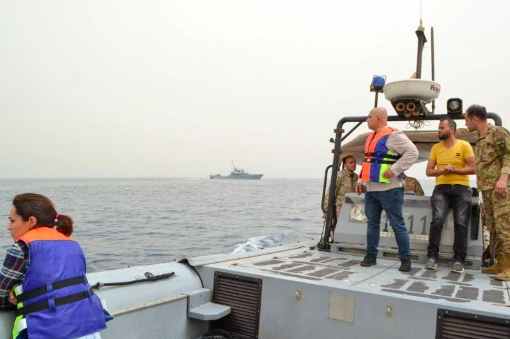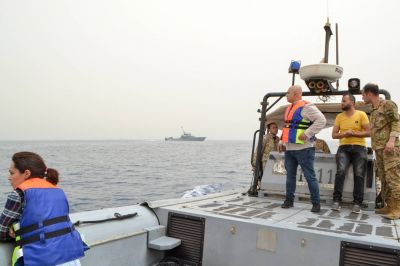
The search carried out by the army on April 24, to find the passengers of a migrant boat sunk off the coast of Tripoli. (Credit: AFP)
More than 120 people, mostly Lebanese, along with Syrian and Palestinian refugees who were residing in Lebanon, sailed aboard an open boat from the coast of Abdeh in Akkar a few days ago.
They were heading for Italy, their gateway to Europe. The news about the migrants’ Mediterranean crossing, one of many, circulated in the media over the past two days given the technical issues that immobilized the boat in Greek territorial waters, forcing the crew to contact authorities in Athens for assistance.
The Greek coast guard responded to the migrants’ call. However, according to activists from Akkar who are closely following up on the case, and the head of the municipal council of Bibnine, Kifah Qassar (the locality that most of the migrants hail from), the Greek authorities offered to take them to an island, but the passengers refused, insisting on being transferred to Italy. They are therefore stuck in their boat until further notice, according to the same sources.
These 120 migrants, a number confirmed by several sources, include many families and parents seeking to take their children to greener pastures.
A new development: This boat did not only carry civilians, but also Lebanese military personnel, some of whom are no longer part of the military institution (or one of the security agencies), while others are still active.
This sea crossing was supposed to last from five to seven days, if it was not for the unexpected technical issue that left the boat immobilized.
The same sources added that the migrants had prepared for a week at sea, securing a sufficient quantity of fuel, logistic equipment, electronic compasses and food.
The boat crossed Lebanese territorial waters without facing any problems, and without coming across the coast guard. It was even about to leave Greek territorial waters when it encountered a technical issue.
Speaking to L’Orient-Le Jour, Qassar said that these migrants “are heroes, who preferred to take the risk of immigrating illegally with dignity rather than leading a life of despair here, due to the state policies and the absence of any balanced development.”
Qassar stressed that the main causes behind this phenomenon are the economic collapse and the increasingly unbearable living conditions, which have pushed many of his locality’s inhabitants to place themselves at the mercy of the sea. He also said that these migrants are mainly members of the Hussein, Masri, Taleb, Tartoussi and Qassar families.
According to him, the Syrians aboard the boat are from the informal camps in Rihanieh and Minyeh, and the Palestinians inhabitants of mainly the Nahr al-Bared camp, where a bitter battle between the Lebanese army and Islamist groups took place in 2007, and whose reconstruction has not yet been completed.
A trend promoted by the climate
This boat is far from being the first to set sail with migrants aspiring for stability and security in Europe on board. The Lebanese still remember the boat that capsized off Tripoli during the month of Ramadan under unclear circumstances, after being intercepted by an army patrol. Several dozen people, men, women and children, are still missing, trapped in the water.
But despite the risk, nothing would prevent migrants from trying to cross the Mediterranean Sea: these journeys obviously only attract the attention of the media if something goes wrong, as in the case of this boat currently stranded off Greece.
A security source told L’Orient-Le Jour, the number of illegal sea crossings of the Mediterranean increase in the summer, when storms are less frequent and the risk of shipwreck is lower. This source denounced the smugglers who facilitate and organize these crossings, for which they receive up to $5,000 per family of four.
However, many migrants have recently been arrested before undertaking their sea crossing, this source continued. Their intentions are generally betrayed by the sale of their furniture or their car for example, the only way for them to secure the cost of the journey.
The authorities have thus prevented several people from embarking on these crossings since April and arrested smugglers, the source said. While Tripoli is usually under the spotlight in this regard, the coast of Abdeh has become the ideal departure point for sailing.
This article was originally published in French in L'Orient-Le Jour. Translation by Joelle El Khoury.
